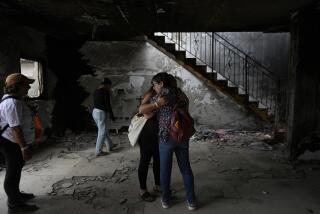Army Probes Induction of Gunman With Mental Problems
- Share via
JERUSALEM — Hebron gunman Noam Friedman appeared in court Thursday and was ordered held for 10 days as the Israeli army launched an inquiry into why he was drafted despite a history of psychological problems.
Israeli security officials also disclosed Thursday that they had arrested a second soldier, Yuval Jibli--who served in the same unit as Friedman--in connection with Wednesday’s shooting of Palestinians at a market.
Jibli, 21, is not suspected of helping Friedman carry out the attack, in which five people were wounded, but of failing to stop it, police said.
Friedman, 22, insisted after his court appearance that he had acted alone and had “no idea” why Jibli was detained. Jibli denied wrongdoing but was ordered held for four days for investigation.
Friedman, a gangly young man who wears a black skullcap and the fringed prayer shawl of an observant Jew, has claimed religious justification for the bloodshed, carried out with his army-issued M-16 rifle.
He also reportedly told interrogators that his one regret was that no Arabs died in the attack, which he said was aimed at blocking a pending deal to transfer most of Hebron from Israeli to Palestinian control.
The attack appears to have delayed the long-awaited accord by at least a few days.
Negotiators continued Thursday to try to arrange a meeting between Israeli Prime Minister Benjamin Netanyahu and Palestinian Authority President Yasser Arafat to wrap up the deal.
Amid a public outcry here over why Friedman was let into the military and was issued a gun, the army said it has opened a probe into his “induction, medical status, and the circumstances under which he was allowed to carry a weapon.”
A preliminary investigation indicated that health officials, when Friedman was drafted seven months ago, did not transfer relevant information about his mental health to the army, Israeli television news reported.
For the Palestinians wounded in the attack, three of whom remained hospitalized Thursday, Friedman’s motivation--and whether he carried out the attack because he is mentally ill or a religious zealot bent on hurting and killing Arabs for ideological reasons--was unlikely to make much difference.
But for Israelis, the shooting raised tough questions, hotly debated in media here Thursday.
If Friedman had a history of mental instability, why was he let into the army? Or did his conduct fit a pattern of violent acts by religious nationalists aimed at derailing the peace process with the Palestinians, a process that they believe threatens Jews and Israel?
Friedman on Thursday repeated his justification: Hebron, home of the Cave of the Patriarchs, “purchased by our father Abraham for 400 shekels of silver,” was about to be given away, he asserted. He referred to the Old Testament account of the purchase of the cave and the city’s imminent hand-over to Palestinians. He hoped to keep the latter from occurring, he said.
The cave is holy to Jews and Muslims, the burial place of Abraham, tradition holds, and other biblical figures, including Sarah, Isaac and Jacob.
Friedman’s melding of religious and nationalist zeal provided echoes of Baruch Goldstein, a Jewish settler who also focused on Hebron and the cave. In February 1994, Goldstein fatally shot about 30 Muslims praying at the site.
For Israelis, Wednesday’s incident also brought to mind Yigal Amir, the religious nationalist who assassinated Prime Minister Yitzhak Rabin in November 1995.
As information about Friedman emerged, a picture formed of a delusional young man with a history of problems. He was, according to interviews and media reports, lonely and unbalanced.
Elisha Vischlitzky, a rabbi at Merkaz Haarav yeshiva, noted that Friedman was expelled from the seminary after about a year of study, saying: “People saw that he began to act strangely. He imagined things, figures and imagined that God had revealed himself to him.”
The rabbi said he had spoken with Friedman then and came away believing that the young man needed psychological care.
“It was obvious that . . . without treatment, without the ability to provide him with more personal attention, it would not be right for him,” he said of Friedman and religious study. “The strangest thing is that he made it to the army.”
Internal Security Minister Avigdor Kahalani said Friedman has been hospitalized for mental problems.
Nahum Barnea, a popular columnist for Yediot, said the Hebron incident should “light up some red lights at the [Israeli army].”
He noted that some Israelis fake mental problems to avoid military service, but “apparently the [army] is too quick to exempt people posing as lunatics and too quick to enlist the real lunatics.”
But others said Thursday that Friedman’s statements also indicated that Israel’s religious right, widely accused of responsibility after the Rabin assassination, should bear at least a share of the burden for this bloodshed too.
“Why is it that, whenever we find someone ready to kill someone else on an ideological ground, they always have a [skullcap] on their heads and always graduate from a religious kind of education?” asked Avinoam Brug of the Gallup Institute in Tel Aviv and a psychologist by training.
In Washington, the State Department warned Americans to exercise caution when traveling in the West Bank, Gaza Strip or Jerusalem because of “the potential for terrorist action” in the next two weeks.
Batsheva Sobelman of The Times’ Jerusalem Bureau contributed to this report.
More to Read
Sign up for Essential California
The most important California stories and recommendations in your inbox every morning.
You may occasionally receive promotional content from the Los Angeles Times.










